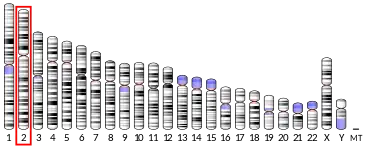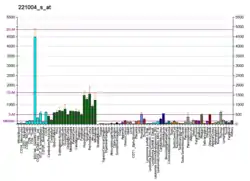ITM2C
Integral membrane protein 2C is a protein that in humans is encoded by the ITM2C gene.[4][5]
References
- GRCh38: Ensembl release 89: ENSG00000135916 - Ensembl, May 2017
- "Human PubMed Reference:". National Center for Biotechnology Information, U.S. National Library of Medicine.
- "Mouse PubMed Reference:". National Center for Biotechnology Information, U.S. National Library of Medicine.
- Mao M, Fu G, Wu JS, Zhang QH, Zhou J, Kan LX, Huang QH, He KL, Gu BW, Han ZG, Shen Y, Gu J, Yu YP, Xu SH, Wang YX, Chen SJ, Chen Z (Aug 1998). "Identification of genes expressed in human CD34+ hematopoietic stem/progenitor cells by expressed sequence tags and efficient full-length cDNA cloning". Proc Natl Acad Sci U S A. 95 (14): 8175–80. doi:10.1073/pnas.95.14.8175. PMC 20949. PMID 9653160.
- "Entrez Gene: ITM2C integral membrane protein 2C".
Further reading
- Adams MD, Kerlavage AR, Fleischmann RD, et al. (1995). "Initial assessment of human gene diversity and expression patterns based upon 83 million nucleotides of cDNA sequence" (PDF). Nature. 377 (6547 Suppl): 3–174. PMID 7566098.
- Auffray C, Behar G, Bois F, et al. (1995). "[IMAGE: molecular integration of the analysis of the human genome and its expression]". Comptes Rendus de l'Académie des Sciences, Série III. 318 (2): 263–72. PMID 7757816.
- Liew CC, Hwang DM, Fung YW, et al. (1994). "A catalogue of genes in the cardiovascular system as identified by expressed sequence tags". Proc. Natl. Acad. Sci. U.S.A. 91 (22): 10645–9. doi:10.1073/pnas.91.22.10645. PMC 45078. PMID 7938007.
- Maruyama K, Sugano S (1994). "Oligo-capping: a simple method to replace the cap structure of eukaryotic mRNAs with oligoribonucleotides". Gene. 138 (1–2): 171–4. doi:10.1016/0378-1119(94)90802-8. PMID 8125298.
- Deleersnijder W, Hong G, Cortvrindt R, et al. (1996). "Isolation of markers for chondro-osteogenic differentiation using cDNA library subtraction. Molecular cloning and characterization of a gene belonging to a novel multigene family of integral membrane proteins". J. Biol. Chem. 271 (32): 19475–82. doi:10.1074/jbc.271.32.19475. PMID 8702637.
- Suzuki Y, Yoshitomo-Nakagawa K, Maruyama K, et al. (1997). "Construction and characterization of a full length-enriched and a 5'-end-enriched cDNA library". Gene. 200 (1–2): 149–56. doi:10.1016/S0378-1119(97)00411-3. PMID 9373149.
- Zhang QH, Ye M, Wu XY, et al. (2001). "Cloning and Functional Analysis of cDNAs with Open Reading Frames for 300 Previously Undefined Genes Expressed in CD34+ Hematopoietic Stem/Progenitor Cells". Genome Res. 10 (10): 1546–60. doi:10.1101/gr.140200. PMC 310934. PMID 11042152.
- Wiemann S, Weil B, Wellenreuther R, et al. (2001). "Toward a Catalog of Human Genes and Proteins: Sequencing and Analysis of 500 Novel Complete Protein Coding Human cDNAs". Genome Res. 11 (3): 422–35. doi:10.1101/gr.GR1547R. PMC 311072. PMID 11230166.
- Simpson JC, Wellenreuther R, Poustka A, et al. (2001). "Systematic subcellular localization of novel proteins identified by large-scale cDNA sequencing". EMBO Rep. 1 (3): 287–92. doi:10.1093/embo-reports/kvd058. PMC 1083732. PMID 11256614.
- Vidal R, Calero M, Révész T, et al. (2001). "Sequence, genomic structure and tissue expression of Human BRI3, a member of the BRI gene family". Gene. 266 (1–2): 95–102. doi:10.1016/S0378-1119(01)00374-2. PMID 11290423.
- Strausberg RL, Feingold EA, Grouse LH, et al. (2003). "Generation and initial analysis of more than 15,000 full-length human and mouse cDNA sequences". Proc. Natl. Acad. Sci. U.S.A. 99 (26): 16899–903. doi:10.1073/pnas.242603899. PMC 139241. PMID 12477932.
- Wu H, Liu G, Li C, Zhao S (2004). "bri3, a novel gene, participates in tumor necrosis factor-alpha-induced cell death". Biochem. Biophys. Res. Commun. 311 (2): 518–24. doi:10.1016/j.bbrc.2003.10.038. PMID 14592447.
- Ota T, Suzuki Y, Nishikawa T, et al. (2004). "Complete sequencing and characterization of 21,243 full-length human cDNAs". Nat. Genet. 36 (1): 40–5. doi:10.1038/ng1285. PMID 14702039.
- Gerhard DS, Wagner L, Feingold EA, et al. (2004). "The Status, Quality, and Expansion of the NIH Full-Length cDNA Project: The Mammalian Gene Collection (MGC)". Genome Res. 14 (10B): 2121–7. doi:10.1101/gr.2596504. PMC 528928. PMID 15489334.
- Wickham L, Benjannet S, Marcinkiewicz E, et al. (2005). "Beta-amyloid protein converting enzyme 1 and brain-specific type II membrane protein BRI3: binding partners processed by furin". J. Neurochem. 92 (1): 93–102. doi:10.1111/j.1471-4159.2004.02840.x. PMID 15606899. S2CID 36799858.
- Rual JF, Venkatesan K, Hao T, et al. (2005). "Towards a proteome-scale map of the human protein-protein interaction network". Nature. 437 (7062): 1173–8. doi:10.1038/nature04209. PMID 16189514. S2CID 4427026.
- Otsuki T, Ota T, Nishikawa T, et al. (2007). "Signal sequence and keyword trap in silico for selection of full-length human cDNAs encoding secretion or membrane proteins from oligo-capped cDNA libraries". DNA Res. 12 (2): 117–26. doi:10.1093/dnares/12.2.117. PMID 16303743.
- Oh JH, Yang JO, Hahn Y, et al. (2006). "Transcriptome analysis of human gastric cancer". Mamm. Genome. 16 (12): 942–54. doi:10.1007/s00335-005-0075-2. PMID 16341674. S2CID 69278.
This article is issued from Wikipedia. The text is licensed under Creative Commons - Attribution - Sharealike. Additional terms may apply for the media files.


